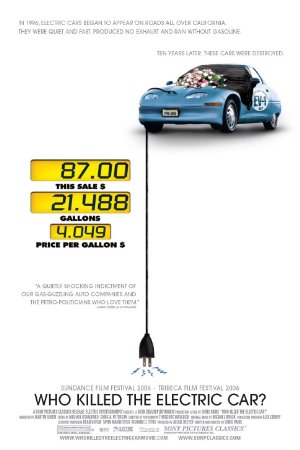Who Killed the Electric Car? Review
By Chris Cabin
In the '90s, there was a brief moment where it looked like all these oil concerns could be alleviated. Many of the most prominent car companies had designed a car that, much like a cell phone, could simply be plugged in at night and would be ready to drive to and from work when you got up. However, most of these cars never saw the light of day and those that did were quickly called back, even ones that were given to celebrities like Tom Hanks and Mel Gibson. The film presupposes that this was a conspiracy concocted by the oil companies, the government, and the car companies to keep us all sucking at the slick-black oil teat. A good case is made in the film, but it's not really delivered with enough conviction or backing.
How did Paine allow crazy Mel Gibson to run away with the film? The most engaging parts of the film are watching Gibson yammering on about how much he loved his electric car. Besides these brief moments, the film is left to stand alone on its educated legs, devoid of charm or real humor. Expect to see eyes roll when an engineer who worked on the EV1 (Electric Vehicle 1) goes to a car museum and pets the last electric car that hasn't been brought in for destruction. Even worse, Paine stages an actual funeral for the damn car, in some peculiar stab to amp up a satirical edge. The information, as stated before, makes a good case that this was a money-over-the-greater-good conspiracy. But where An Inconvenient Truth has the information and a bewilderingly-charming Al Gore to supply reasons, Who Killed the Electric Car? has no focus or reason apart from its history lesson.
Electric Car brings up an interesting idea that it might not have intended to do: Is there any surprise that the oil companies would pull something like this? It's hard to refute that the oil companies are willing to do just about anything to keep the money rolling in along with the black gold. So, why try to bill a film like this as an "important" film? It doesn't bring up anything supremely new or surprising to merit attention, nor does it have even half the entertainment that the Hybrid episode of South Park had. What it does have is a ticket into the much overpopulated current culture of conspiracy, where anyone with a secret document or a hushed correspondence can make a 90-minute film and feel like they are Woodward and Bernstein. They're not, and, to no surprise, the shit storm is still looming in the distance.
Reviewed as part of the 2006 Tribeca Film Festival.

Facts and Figures
Year: 2006
In Theaters: Friday 4th August 2006
Box Office USA: $1.3M
Distributed by: Sony Pictures Classics
Production compaines: Plinyminor, Electric Entertainment, Papercut Films
Reviews
Contactmusic.com: 2 / 5
Rotten Tomatoes: 88%
Fresh: 92 Rotten: 12
IMDB: 7.7 / 10
Cast & Crew
Director: Chris Paine
Producer: Jessie Deeter
Screenwriter: Chris Paine
Starring: Martin Sheen as Narrator, Mel Gibson as Himself, Tom Hanks as Himself
Also starring: Alexandra Paul














